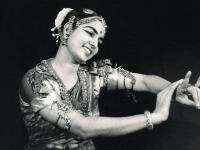 Rukmini Devi Arundale (1904-1986) Rukmini Devi Arundale (1904-1986)Rukmini Devi was born in a Brahmin family[5] She married the prominent British theosophist Dr George Arundale—a close associate of Annie Besant in 1920 when she turned 16 and he was 26 years her senior at 42, much to the shock of the then conservative society. It was at the behest of the famous Russian ballerina Anna Pavlova, that Rukmini Devi turned her attention to discovering traditional Indian dance forms which had fallen to disrepute, and dedicated the rest of her life to their revival.
In January 1936, she established Kalakshetra, an academy of dance and music, built around the ancient Indian Gurukul system, at Adyar, at Chennai. Today the academy is a deemed university under the Kalakshetra Foundation Amongst its noted students are Radha Burnier, Sarada Hoffman, Anjali Mehr, Kamaladevi Chattopadhyay, Sanjukta Panigrahi, C V Chandrasekhar, Yamini Krishnamurthy and Leela Samson.
Originally known as sadhir, the Indian classical dance form of Bharatanatyam owes its current name, to E Krishna Iyer and Rukmini Devi Arundale, who had been instrumental in modifying mainly the Pandanallur style of Bharatanatyam and bringing it to the global attention.
Rukmini Devi was nominated as a member of the Indian Parliament's Council of States (the Rajya Sabha) in April 1952 and re-nominated in 1956. She was the first Indian woman to be nominated in Rajya Sabha. Padma Bhushan (1956)
|


